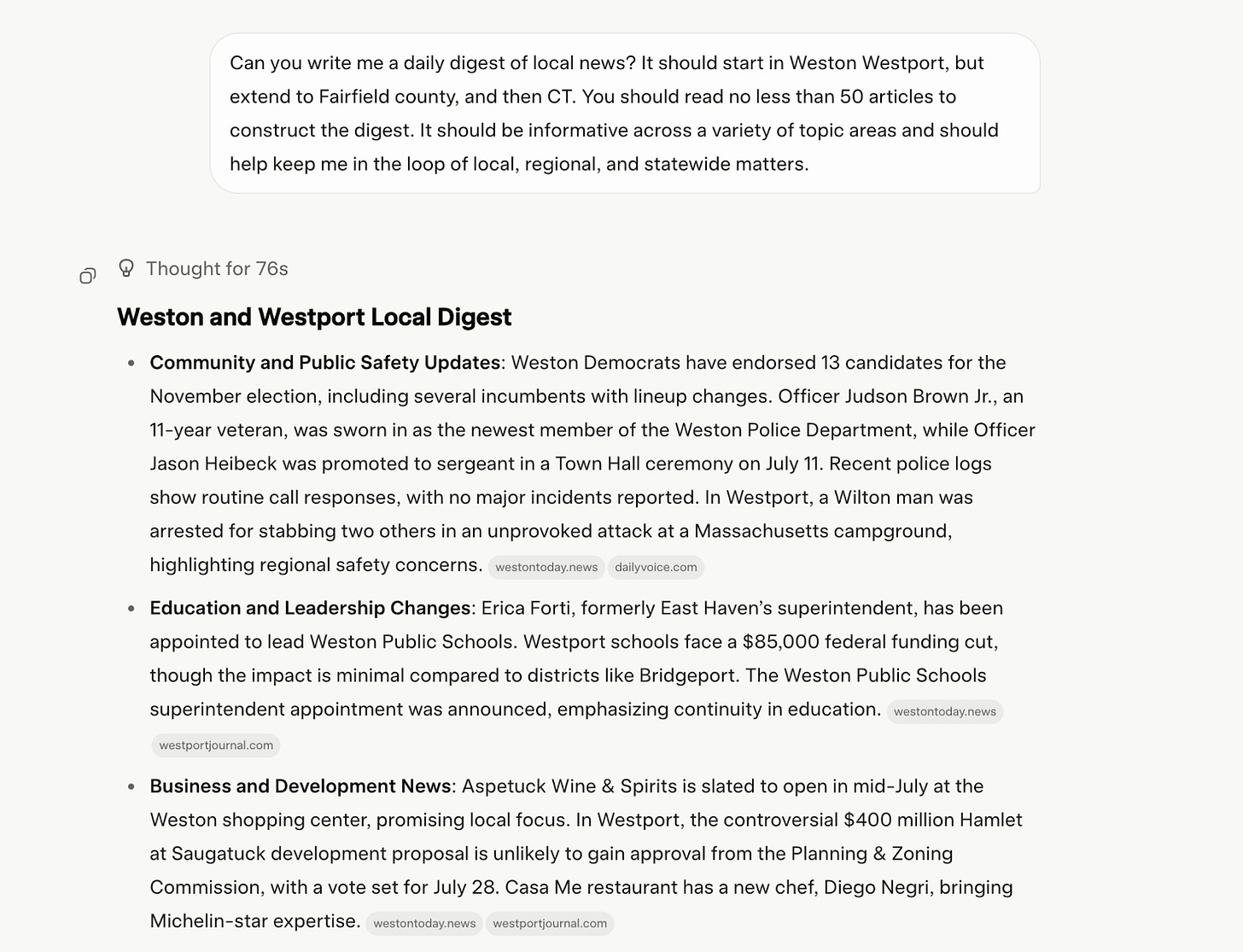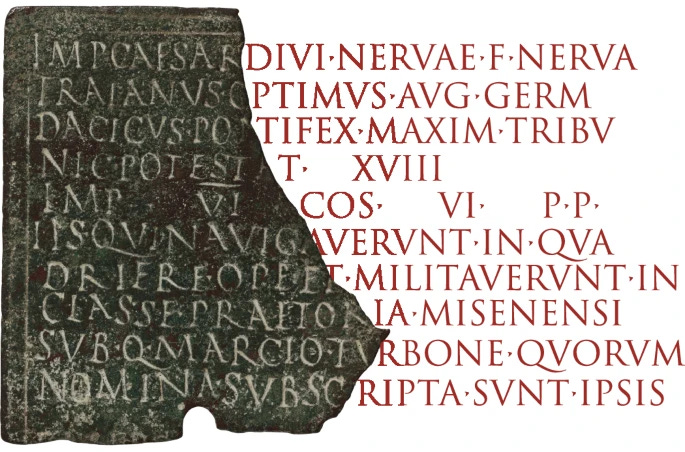We're Starting an AI Questions Hotline // BRXND Dispatch vol 88
Plus, Anthropic vs. Trump on infrastructure, medical AI's trust problem, and Mistral's energy report.
You’re getting this email as a subscriber to the BRXND Dispatch, a newsletter at the intersection of marketing and AI. We’re hosting our next BRXND NYC conference on September 18, 2025, and are currently looking for sponsors and speakers. If you’re interested in attending, please add your name to the waitlist.
What's On My Mind This Week
Noah here. A few random things to add this week.
If you read/watched my talk from BRXND LA, I’ve been getting fairly obsessed with bureaucracy. To that end, I’m planning to start a Bureaucracy book club. The first two books are Kafka’s The Trial and David Graeber’s The Utopia of Rules. If you’re interested in joining, let us know and we’ll figure out some way to all talk about it.
One little AI feature I’ve found myself using more and more lately is tasks in ChatGPT (and now Grok). You can set something to run at any frequency you want. I have a few checking on products I’m waiting for (like the NVIDIA DGX Spark), and recently I did one to aggregate local news. Check it out here. (Daily might be a bit much, but it’s a fun experiment.)
Do you have AI questions you’re too embarrassed to ask? We've put together a simple form to allow people to submit their questions anonymously, and we’ll try to address each one each week (if anyone asks) and respond via email. You can ask your question here. Remember, there’s no question too big or small, smart or stupid, so ask away!
What Caught My Eye This Week
Claire here. Two new visions for American AI infrastructure emerged this week.
Anthropic's “Build AI in America”:
Projects the U.S. AI sector will need at least 50GW of electric capacity by 2028
Proposes partnering with utilities and leveraging federal lands while maintaining environmental reviews
Emphasizes sustainable growth through collaboration with states and communities
Trump's "America's AI Action Plan”:
Creates "AI Economic Zones" on federal lands with streamlined permitting
Invokes Defense Production Act and NEPA modifications to fast-track infrastructure
Declares AI infrastructure a national security imperative requiring emergency measures
Both documents cite China's 400GW of new generation capacity added last year—ten times what the U.S. added. While they agree on the urgent need for massive infrastructure investment, they diverge sharply on method: Anthropic seeks collaborative development with environmental safeguards, while the Trump plan prioritizes speed through executive authority and regulatory bypass.
WIRED examined how the medical world is grappling with the rise of "Dr. ChatGPT" as patients increasingly turn to AI for diagnoses. People who couldn't get answers after years of specialist visits are finding solutions in minutes through ChatGPT, like the Reddit user whose five-year jaw clicking problem was solved by the AI's suggestion of a tongue placement technique. Harvard Medical School is now teaching students how to work with AI tools, and OpenAI launched HealthBench in May to measure AI's medical capabilities with help from 260 physicians across 60 countries. The company claims its latest models perform as well as or better than human doctors on their benchmarks. But the integration remains messy—while studies from 2023 showed AI alone outperformed doctors (92% vs 76% accuracy), physicians struggled to use it effectively. As Harvard's Adam Rodman observed: "They loved it when it agreed with them, and they disregarded it when it disagreed with them. They didn't trust it when the machine told them that they were wrong."
This pattern of humans struggling to effectively use AI tools extends beyond medicine. A new Nature study examined how historians use an AI system called Aeneas to analyze ancient Latin inscriptions. When provided with AI-generated parallels and insights, historians found them useful as research starting points 90% of the time, and their confidence in key tasks improved by 44%. The study found that human-AI teams consistently outperformed either working alone—but only when the humans understood how to properly leverage the AI's capabilities. Whether it's doctors diagnosing patients or historians decoding ancient texts, the lesson is the same: AI works best as a sophisticated collaborator, not an oracle or a simple search engine.
Mistral AI just did something unprecedented: they told us how much energy they use. Their report reveals that training Mistral Large 2 generated 20.4 kilotons of CO₂ equivalent, consumed 281,000 cubic meters of water, and required 660 kg of antimony-equivalent resource depletion after 18 months of usage. The French company also broke down the impact of inference: each 400-token response from their Le Chat assistant uses 1.14g CO₂e and 45mL of water. Mistral is proposing standardized metrics for the industry and calling on competitors to follow suit. This transparency arrives as data centers are projected to consume 9% of U.S. electricity by 2030. Whether other major AI companies will follow Mistral's lead remains to be seen, but it's refreshing to see actual numbers.
Jason Koebler of 404 Media writes that Facebook pages are now churning out bizarrely specific AI-generated content for every conceivable niche—like Louisiana State University football coach Brian Kelly rescuing people from the tragic Texas floods. As Koebler reports, “There is slop of Kelly getting his lost wallet returned to him, donating to the homeless, slop of Kelly in the hospital with a rare illness, slop of Kelly being deported by Trump, talking to Apple CEO Tim Cook, and slop of Kelly secretly ‘paying off the debt owed by a struggling gardener.’” The slop economy has gotten so cheap to produce that spammers can run hundreds of pages, flooding feeds with whatever the algorithm thinks you'll engage with. As Koebler notes, we're on a path where social media will feed you "hyperpersonalized AI slop about anything and everything," though I’d like to know why my hyperpersonalized slop is weird photos of Simone Biles wearing racist shirts.
If you have any questions, please be in touch. If you are interested in sponsoring BRXND NYC, reach out, and we’ll send you the details.
Thanks for reading,
Noah and Claire







great edition, love the hotline idea. and thanks for breaking down the trump AI bill, that's gotten lost in the news cycle for me.